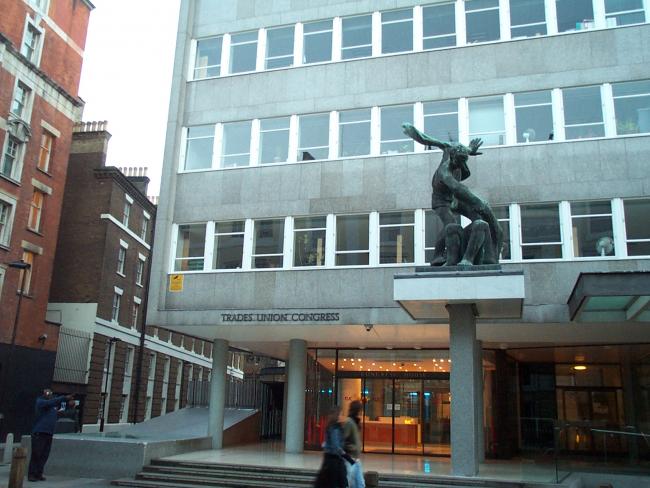
TUC headquarters, London. Photo Kaihsu (CC BY-SA 3.0).
The TUC congress met in Brighton from 18 to 20 October, having been delayed by the Queen’s death. Much of the agenda was routine and predictable, but some unions are thinking honestly and hard about the future of their industries and of Britain.
Take two examples. The GMB, one of the largest unions, proposed a motion on economic recovery and manufacturing jobs which stated that “rebuilding a modern, high-tech, manufacturing sector as the fundamental wealth creating aspect of the economy should be a priority”; that “the power of the finance sector must be curtailed”; and that “we must build up self-reliant production, with extensive government and local government procurement from British-based and -owned producers”.
Who could object to that? Yet objections did come, for the GMB organises workers in defence, and this offended some delegates in non-industrial unions, who consider such workers morally tainted. Nevertheless, Congress passed the motion and will campaign for a national commission for manufacturing to oversee a revival of production and skills development.
The TUC can reflect class thinking, good or bad, but it is in the constituent unions and their industries where progress will happen.
Another positive example, from one of the smallest unions, was a motion from the Royal College of Podiatry calling for an industrial strategy to provide fit for purpose, personal protective equipment (PPE) for health workers and those in social care. Before the pandemic less than 1 per cent of the PPE used in Britain was made here. The motion said we should ensure this never happens again – by putting a strategy in place for production in Britain.
There’s no need to comment here in detail on the proceedings of the TUC. Workers can read them for themselves elsewhere, if they wish, and they have a keen nose for the platitudes, self-promotion, and wrecking sometimes present in motions.
Coordination?
Many of the motions, intentionally or not, misrepresent the role of the TUC and seek to make it something it can never be. For example a motion from the PCS union, representing civil servants, called on the TUC to coordinate industrial action.
The PCS should consider working class history: the last time the TUC tried to coordinate strikes was 1926, and that didn’t end well. Nor did the TUC’s promotion of the social contract in the 1970s – see Historic Notes in this edition.
The strength of British trade unions comes from their history of skill – the organisation of skilled trades and crafts, based on the workplace. In other countries trade union federations were built on political or even religious affiliation.
The TUC can reflect class thinking, good or bad, but it is in the constituent unions and their industries where progress will happen.
Refreshing
A letter sent out to the Unite membership in October may indicate a refreshing return to basics. The union’s general secretary Sharon Graham, elected in August 2021, is in office at a time when, as she says, “employers are emboldened” to launch an assault on jobs and wages, many using the tactic of fire and rehire. P&O Ferries and the Ports of Felixstowe and Liverpool spring to mind. And there are others. In truth, there is no such thing as the good employer.
The Unite letter sets out key priorities for the union – focused on the workplace and the class relationship between capital and labour. Nowhere is there mention of the divisive and distracting issues of identity, gender and race. New members will be in no doubt they are joining an organised fight for jobs, pay and conditions – precisely what unions are for.
Nor does Unite expect to rely on the TUC. A permanent dispute team will support those in struggle, shop stewards and workplace reps will be strengthened, bargaining will be coordinated, the training of reps brought back in-house and “dedicated to building power at the workplace”. A review of democratic structures within the union is intended to devolve more power over crucial decisions to the membership via their shop stewards.
Unite has committed itself to ensuring that workers are not made to pay the price of the pandemic, the energy crisis and inflation, the war in Ukraine, or any other crisis foisted on us by the capitalist class. Now it will be up to the membership to see that the union lives up to its ideals.
